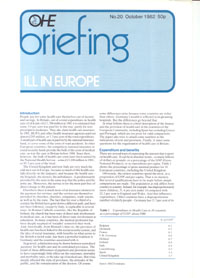Sign up to our newsletter Subscribe
Challenges and Solutions for Budget Impact Analysis of Gene Therapies

People pay for some health care themselves out of income and savings. In Britain, out of a total expenditure on health care of all kinds of £ 13,700 million in 1981 it is estimated that some 3.0 per cent was paid for in…
People pay for some health care themselves out of income and savings. In Britain, out of a total expenditure on health care of all kinds of £ 13,700 million in 1981 it is estimated that some 3.0 per cent was paid for in this way, partly for non-prescription medicines. They also claim health care insurance. In 1981, BUPA and other health insurance agencies paid out almost £205 million, or 1.5 per cent of the total expenditure.
A small part of health care is paid for by the national insurance fund, to cover some of the costs of road accidents. In other European countries, the compulsory national insurance or social security funds provide the bulk of the costs of medical care, as was the case in Britain before 1948. Since then, however, the bulk of health care costs have been carried by the National Health Service – s o m e £13,100 million in 1981, or 95.5 per cent of the total.
The United Kingdom and now Italy are very much the odd men out in Europe, because so much of this health care falls directly on the taxpayer, and because the health care – the hospitals, the doctors, the ambulances- is predominantly provided by the state in the same way that the police and the army are. Moreover, the service is for the most part free of direct charge to the patient.
Elsewhere there is much more of an insurance element in the payment for services, and the services are themselves provided by churches, charities, companies, trade unions, as well as by the state. The fact that for over a third of a century the British have gone down a different path, and have not been followed, except by Italy, is explicable in several ways. In Roman Catholic countries, like the Republic of Ireland, the church has been wary of direct state involvement in medical care, as it has been of direct state involvement in education. In many countries, the medical profession has been deeply sceptical of ‘socialist’ control of their work. And, historically, from Bismark’s time on, the provision of health care has been linked to the social security system, and the idea of social insurance, with benefits on what seems to the British a lavish scale, has been a powerful tradition in Germany and the countries associated with it.
In general, a distinction may be drawn between centralised payment for health care and its centralised provision. The result of these differences of payment and provision seems to have surprisingly little effect on the outcomes, mortality and morbidity rates, or the take-up of medical care. But it has deeply affected the style of provision, the attitudes of the public, and the remuneration of the doctors. Of course some differences arise because some countries are richer than others. Germany’s wealth is reflected in its gleaming hospitals. But the differences go beyond that.
In what follows there is a brief description of the finance and the provision of health care in the countries of the European Community, including Spain but excluding Greece and Portugal, which are too poor for valid comparisons. The paper also tries to attach some numbers to the indications of cost and provision. Finally, it raises some questions for the organisation of health care in Britain.
Ill in Europe
